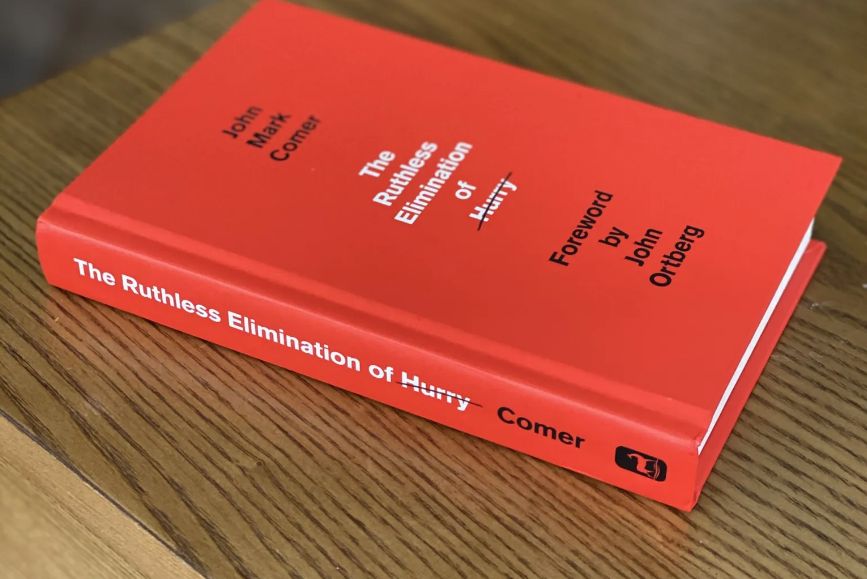
'The Ruthless Elimination of Hurry' by John Mark Comer
My reading group of 5 people picked The Ruthless Elimination of Hurry for 3 reasons:
- We’d all heard of it. In fact it seemed like everyone we knew had heard of it. Iit was rare to see a Christian online profile that hadn’t listed it under ‘Recent Book That Inspired Me’.
- That meant we knew we could borrow enough copies for everyone.
- The chapters are VERY VERY SHORT.
Yes, we are that kind of book group.
What’s it about?
In the opinion of John Mark Comer, a pastor in Portland USA, hurry might be the biggest obstacle to a rich spiritual life. He spends the first half delving into why he thinks this, what’s causing it, and the tangible results of too much hurrying in our own lives. The second half is built around suggesting ways to combat the problem.

Inside the book
To be honest the thing we primarily enjoyed about this book was the layout. It has short sentences and lots of empty space on the page, so it's possible to cover ground quickly. The writing style is similar; casual and informal. Some may find it patronising but for those not used to reading spiritual books, or who feel they don’t have much time to read (and therefore might choose this title!) it does make it very accessible.
Hurry proposes fairly simple ideas that we all may instinctively know - or ought to. As the group read, however, we found ourselves increasingly confronted with our own habits. It was surprising just how we’d unconsciously started mirroring the global statistics and trends John Mark was discussing in our own lives. Particularly in terms of what distracted us and made us rush around.
The second half of the book is more of a mixed bag, focusing on practical ideas about how we might eliminate hurry from our lives. These are well-meant, but veer between genuinely useful and out-of-touch. Obviously, John Mark can’t write advice that will fit every person, but some ideas still sounded a little trite coming from a financially well-off guy with a stable marriage, shared parental responsibilities, no daily desk or factory job, and who is at liberty to check his work emails only once a day (Once a day!! I can’t even imagine it!) He does acknowledge this and says several times that his suggestions should be adjusted for your own life, but it did cause some grumbling. Your mileage may vary.
The fact that our group met once a week to discuss each chapter turned us into a little petri-dish of investigation. One person reinstated the habit of reading a book before bed. Another found an app that put a curfew on their social media use. We experimented with times of being quiet. A fan of yoga led a short meditation. They were small changes but still appreciated.
Any conclusions?
The Ruthless Elimination of Hurry is a very light skim across the surface of this topic. It’s not massively deep, but it isn’t trying to be. There’s a fine line between introducing a spiritual practice and toppling into generic self-help. Hurry succeeds better in its first half than its second, but was still a decent framework to help us think about the kind of lives we’d like to aim for. It attempts some theology occasionally, or includes a Bible verse, but doesn’t expand on it much. Still, there’s some general good advice in there.
Having read several of John Mark Comer’s books, I wouldn’t recommend them all, but this one is a fairly safe bet if spiritual books normally feel intimidating, and you can take his ideas with a generous pinch of salt.
It certainly didn’t hurt to have that ‘back to basics’ check-in where (without letting ourselves feel guilty about the responsibilities in our lives) we could find a few ways to carve out a few more pockets of rest and quiet.
